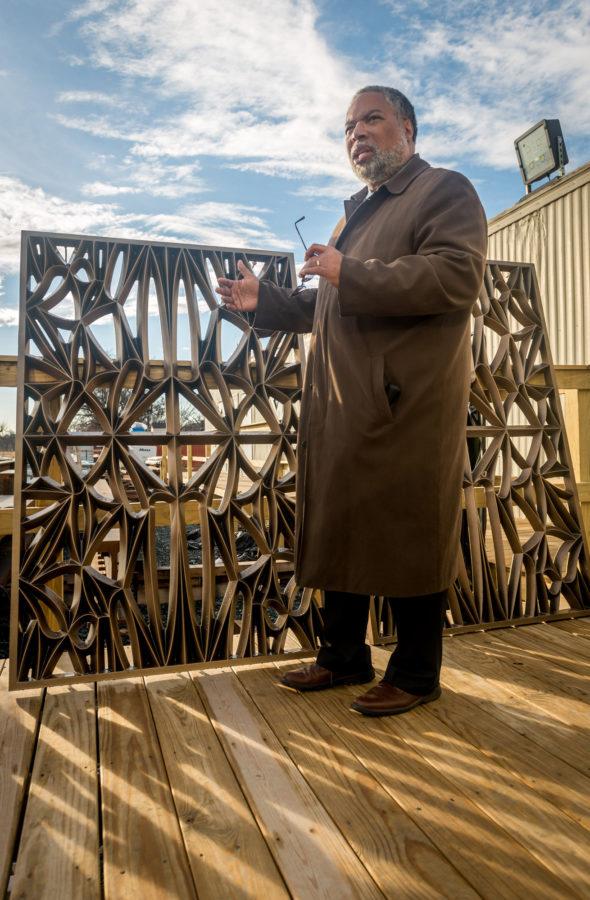Black History: A civil movement that never stops
Director of the Smithsonian Institute National Museum of African American History and Culture Lonnie Bunch III talks about the design of the bronze plated aluminum panels which will comprise the bronze and glass-panel façade, known as the Corona, during a tour of the museum construction site at 14th St. NW and Constitution Avenue in Washington, D.C. on Feb. 21, 2014. The Corona is a representation of traditional African architecture using modern materials and will visually define the museum. The Corona will hang from the top of the museum with no intermediate support on the side of building.
Feb 9, 2016
Last updated on Nov. 1, 2016 at 08:23 p.m.
“Let us march on till victory is won,” from the song “Lift Every Voice and Sing” (famously known as “The Black National Anthem,”) are eight words that hit home for Ronald Bailey, head of the Department of African American Studies.
During Black History Month, Bailey reflects on his childhood experiences.
He grew up in a racially segregated community in rural Georgia and graduated from an all-black high school before moving on to seek a higher degree. Like many African-Americans living in the south during the time of the civil rights movement, Bailey understood the importance of racial equality and was determined to educate people in order to create a just future.
“We need to be constantly reminded of the continuing legacy of a history that includes slavery and racial segregation,” Bailey said. “Part of the history is not only understanding the impact of racial segregation, but it is also understanding how the black community (protected) its young people from those conditions and made sure that those young people had the opportunity to strive for excellence.”
Get The Daily Illini in your inbox!
The myth of post-racial society
Unlike Bailey, Faye Harrison, professor of anthropology and African American Studies, said that while she grew up in a racially segregated Virginia, she did not feel that her childhood education lacked any opportunities.
As a young black girl in a segregated community, Harrison experienced a lot of fear and anxiety as a result of the attitudes that prevailed toward black people in her town.
“(If) black children or students internalize and inculcate the myth that they are inferior in terms of intellectual capacity, it will have an affect on their performance,” Harrison said.
Harrison used the example of toy dolls to represent her claim. She said that children often think of white dolls as more beautiful as opposed to black dolls, and that creates a threat to black self-esteem.
Harrison states successful individuals such as Barack Obama and Oprah Winfrey have contributed to the myth that racism is no longer an issue in America, one that many Americans buy into.
“It is an ideological slight of hand, or trick, to make people believe that we are living in a post-racial society,” Harrison said. “The problem is structural; it’s not just microaggressions or individual bigotry or prejudice. The issue is having the prejudices and assumptions catapulted by power.”
Addressing racism on campus
Jaylin McClinton, student representative of the University Board of Trustees and senior in LAS, plans to use his position of power to help motivate students to achieve a better state of diversity and inclusion. McClinton thinks the first step to solving the issues of racism on campus is by creating a non-threatening environment for conversation.
“A lot of people shy away from bringing the conversation up because they are very uncomfortable about something as simple as race,” McClinton said.
McClinton states he believes in creating a space where people who have ignorant comments can be educated without being attacked on why their thought process is not the best one. He said that pulling people out of their comfort zones opens up the opportunity to learn more about one another.
“When people challenge you and push you and make you feel uncomfortable, it allows you to reevaluate what your values are,” McClinton said.
Harrison echoed this belief and said facilitating an open conversation about racism can be difficult for many reasons.
“Many white people are afraid of feeling guilty or being accused of doing something wrong. People have difficulty making a separation between themselves as individuals and these broader forces,” Harrison said. “We have a shared responsibility to promote social justice, which means dismantling the unearned privileges that a large number of white individuals have enjoyed given the way the cards have been stacked in their favor.”
For both Harrison and McClinton, American history cannot be fully understood without first understanding black history.
McClinton said that he doesn’t view February as a month different than any other because he celebrates black history every day.
Harrison views it as an opportunity to enunciate the human struggle that remains in modern society.
“It provides a platform and an opportunity to go beyond what we do day to day. In the process, we fill gaps that still exist, we clarify misunderstandings that persist,” Harrison said. “These types of conversations are necessary for us to have the transcendence and imagination about what is possible for the future.”
She said she believes that the start of change happens when people are given a safe space to talk about their principles and ideas in order to eliminate issues of race.
“The University is where we are given the space, where we are given the license and encouragement to think and dream beyond the here and now,” Harrison said.
A revolutionary movement
On campus, an organization known as the Black Students for Revolution, exercises a more radical, leftist version of how to fix racial issues and hopes to start a revolutionary movement.
“Whenever the oppressed groups organize themselves internally, you develop a relationship with people when you organize together, so that’s why we believe that the students are the only ones, so that we can have the numbers and power so that change can come,” said Augustus Wood, graduate student in history and member of the group.
Like McClinton and Harrison, Wood believes that black history cannot be condensed into a single month of celebration, but should rather be celebrated year-round.
“Black history is a narrative of human struggle. It’s not just about one or two charismatic leaders; that’s not how black history works. Black history is a prominent part of American history and is ongoing,” Wood said.
For Bailey, while society has made dramatic changes since slavery and the civil rights movement, he said there is always room for more improvement.
“I think that there is a compelling argument to be made. We haven’t fully addressed (the issue), but there is still a great deal with every generation to keep the dialogue going, so that every generation’s knowledge is deeper and further,” Bailey said. “Resilience. That word refers to the capacity of people to deal with the conditions that confront them and overcome the obstacles that are presented.”






